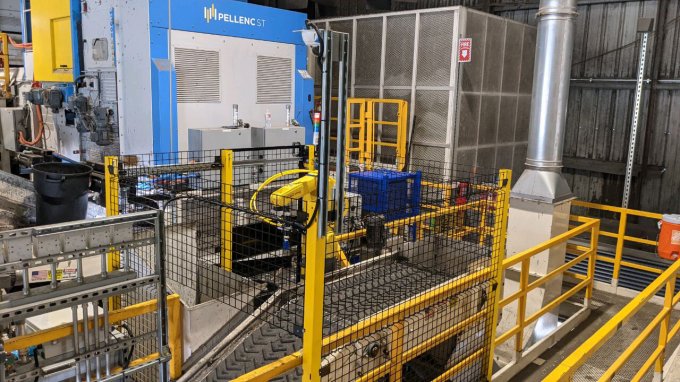During a family trip to India, Jagadeesh Ambati was shocked by how broken the local recycling system had become. After complaining about it to his wife, she challenged him to make a change. He did, eventually, founding EverestLabs to develop an AI system to help recycling facilities recover more waste on average than they did before.
Fast-forward a few years and EverestLabs has achieved “significant momentum,” Ambati claims, pointing to customer deployments in North America, including SIMS Sunset Park in Brooklyn, one of the larger plant operators in the region. With sights set on a global expansion, EverestLabs today closed a $16.1 million Series A round that brings the company’s total raised to $24.63 million.
Translink Capital led the Series A, with participation from NEC Orchestrating Future Fund, BGV, Sierra Ventures, Morado Ventures and Xplorer Capital. Ambati tells TechCrunch that the proceeds will be put toward ongoing sales, operations and product development efforts.
“The pandemic was a blessing in disguise for us as we got quality time with customers after initial lockdowns,” he said in an email. “As a result, we perfected our solutions by doubling down on original R&D.”
EverestLabs endeavors to solve an enduring challenge in the recycling industry: making the plants that process residential and commercial recycling more effective. It’s nearly Sisyphean. In New York City, for example, only about a fifth of garbage is recycled — far below the maximum theoretically possible — reportedly in part because garbage crews, under pressure to complete long routes, mix sorted recyclables with trash.
EverestLabs’ solution is a suite of software and on-premises hardware for recycling plants that identifies objects on conveyor lines and routes those objects to the right destinations. Developed over the course of three and a half years, Ambati says that the object recognition algorithms were trained using proprietary datasets as well as customer data and data from third-party sources.

Image Credits: EverestLabs
“We’re the first company in the recycling space to have the AI software audited by a local city-run plant and their independent auditor,” he claimed. “EverestLabs is the only company in the recycling space that guarantees robotics pick success rate and pick efficacies.”
EverestLabs also sells a service to monitor the existing robotic sorting machines in recycling plants with a team of engineers who track metrics like pick efficiency and accuracy. The engineers also provide maintenance assistance, which Ambati pitches as a way for operators to focus on maintaining pace with the materials they receive and process.
“The decades-old technology used in recycling facilities simply cannot sort everything perfectly. Newer robotic cleanup solutions are not effective enough and are too costly. Human sorters become slower and slower over a shift, due to the substandard working conditions and mundaneness of the task, leading to high costs for low output,” Ambati asserted. “It does not matter how much or how well we recycle in our homes and businesses. If the material recycling facilities don’t do a great job at recovery; then everything ends up in landfills.”
EverestLabs isn’t the first to realize the huge addressable market represented by recycling. A cursory Google search surfaces at least half a dozen companies tackling recycling blockers from different angles, like Glacier and Gongeye Technology — startups that use robotics and databases of information about different types of waste to sort trash. Closer to home, there’s CleanRobotics, a Colorado-based firm leveraging machine learning to sort materials from a single disposal point. U.K.-based TrueCircle employs computer vision to attempt to improve recovery rates and quality at recycling facilities. And then there’s AMP Robotics, which designs picker arms that can distinguish between small recyclable materials and place them where they need to go.
But Ambati — while declining to comment on EverestLabs’ revenue — claims he’s not seeing any slowdown in business. Ambati rattled off EverestLabs’ other customers, which include Recology, Alameda County Industries and Smart Station, and said that the startup is on track to roughly double its 13-person headcount by the end of the year.
“The war in Ukraine and supply chain issues are challenging, but we are working around the issue,” Ambati said. “We anticipate strong year-over-year growth with sound fundamentals. Our burn rate continues to change as we are hiring lots of new staff.”
As for whether tech like EverestLabs’ can make a difference in recycling, that’s still up for debate. According to the Joint Research Centre of the European Commission, more than 80% of all product-related environmental impacts are determined during the design phase of a product — highlighting the need for manufacturers to shift to more sustainable designs. But the world’s waste problems can’t be blamed on design alone. Consumption patterns must change, ultimately — switching from things like plastic containers to compostable boxes and from plastic shopping bags to reusable.
In the meantime, EverestLabs and its competitors will fight the uphill battle.
EverestLabs raises $16.1M for AI that sorts recyclables by Kyle Wiggers originally published on TechCrunch















 English (US) ·
English (US) ·